Phil Mackie
Midlands correspondent, BBC News

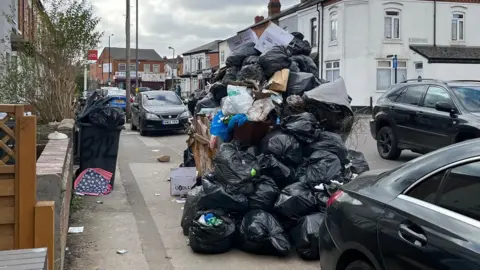 BBC
BBC
In parts of Birmingham waste continues to go uncollected as all-out strike action by bin workers grinds on into its sixth week, leaving some of the city’s 1.2 million residents to deal with the fallout.
The UK’s second city is the largest local authority area in the country, with more than 400,000 households within its boundaries. But they have not been affected equally by the industrial action, and as more time has passed a contrast has begun to emerge.
The dispute has seen waste pile up in some areas, with the problem most stark in the densely populated inner-city areas. Wealthier, more sparsely populated parts have experienced fewer problems.
On the same day that the streets of Balsall Heath were being overwhelmed with rubbish, so much that it was hard in places to walk down the street, a few miles away in wealthy Harborne, wheelie bins stood neatly waiting for collection with no sign of any additional waste.
Talks to end the bin strike in Birmingham will not resume until next week, after the Unite union and the city council failed to reach an agreement on Wednesday.
Members of Unite began staging one-day walkouts in January after being told some workers would be downgraded and have their pay cut.
The action escalated on 11 March, when more than 300 workers began an all-out strike.
Unite said that if the council was prepared to make a firm offer of a one-off payment and guaranteed that there would not be any further pay cuts, its members would go back to work.

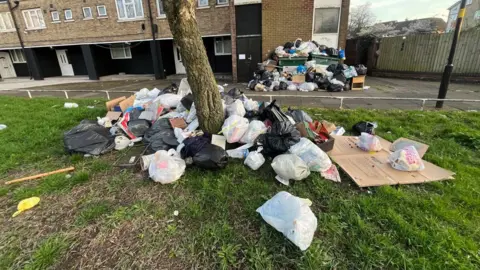
For the first three-and-a-half weeks of the industrial dispute striking bin workers used delaying tactics at the city’s three main depots to prevent the working wagons, staffed by non-union members and agency staff, from leaving to carry out their rounds.
They walked slowly in front of the gates to delay the lorries departing and continued to walk in front of them after they had left the gates for several hundred metres.
Although more than 300 staff are on strike, several hundred are not.
The delaying tactics meant that wagons were stopped from carrying out their rounds and only about 10% of Birmingham’s regular daily bin collections were being completed.
By the beginning of April, because of the industrial action, 22,000 tonnes of uncollected waste had accumulated on the city’s streets.

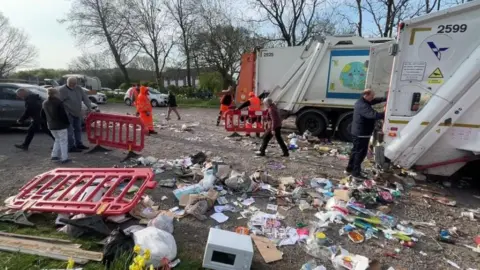
I’ve been covering the industrial action since it began, and even before it escalated, piles of waste were already mounting up in parts of Birmingham.
This time it already seemed worse than the last strike in Birmingham in 2017, and like then, it appeared to highlight the disparity of wealth in Britain’s second city.
The poorer the area, the worse the smell and the bigger the mess.
There was already talk of the infestation of rats, and a pest controller I met in Handsworth told me his workload had already doubled as result of the waste piling up in the streets.
The effects of the strike have been most visible in the city’s most deprived wards and places like Small Heath, Sparkbrook and Ladywood.
Here the streets of Victorian terraced houses are home to large multi-generational families or have been divided into flats.
The population density is highest in this area, so there is more waste, and fewer people have access to cars to take their rubbish to the tips. These are the areas where the biggest piles of rubbish have grown.


In Small Heath I met Semir Said, the senior outreach project manager at the Green Lane Mosque, who described how the area had been affected.
“It’s very obvious really, piles of rubbish, mountains of rubbish really in streets inner city Birmingham, so yeah a very, very big problem,” he said. “Rats feasting is the way I’d describe it, so yes it’s a very, very big problem.”
He told me, he thought the inner city areas were faring worst.
“It’s sad to say but these deprived areas… [you] do find this problem of not being treated fairly, it’s very unfortunate, but it is the reality.”
The mosque was, he said, trying to find its own solutions and that was why they had arranged for the council’s street cleaning team to base their wagons there, so people could bring their rubbish to be disposed of.
Queues of cars were waiting to offload their rubbish, and the mosque had enrolled the services of teenagers on their Easter break to help with the unloading.


During the strike these have been one of the few options people could take to get rid of their rubbish. At one, at Woodgate Valley Park, on the outskirts of the city near its border with Worcestershire I witnessed a queue that was more than a mile long.
Some people had parked their cars and were carrying unwanted items into the site, where everything was simply thrown into the same waste truck – metal, glass, household waste and recycling. Here there was exasperation and anger, and the sense that Birmingham’s reputation was being dragged down.
“It’s absolute carnage, it’s scandalous”, one man with heavy bin bags in each hand and a full car to unload told me.
‘Postcode issue’
I first met Naz Khan during the last bin strike when he and his friends hired a lorry to collect rubbish from people who could not take it away themselves.
Eight years later I bumped into him again, once again trying to help people get rid of their rubbish.
He told me that the problems in his area had been exacerbated by people from elsewhere bringing their rubbish into poorer inner-city areas to get rid of it.
“A lot of people are using our areas to do a lot of fly-tipping”, he said, adding that he felt there was a “postcode issue” when it came to bin collections.
In one of the biggest piles of waste I saw there was an old bed frame, several empty tins of catering cooking oil and even the front bumper from a Toyota.


Other people have also been doing their bit and trying to clear up their neighbourhoods. Sadia Khan, the chair of Friends of Sparkgreen Park, has been organising litter picks since before the strike began, but things have only got worse since it started.
“It feels like the litter picks aren’t making any difference, the litter and the fly-tipping is coming back twofold. It’s a gloomy place to be in, it’s depressing,” she said.
Her aim was to try to clear the park of waste before the Easter weekend so that if the weather was nice, people would be able to head out for picnics.
“You want a beautiful park, enjoy the Easter weekend and the holidays now, and people can’t go for a picnic, they can’t even have time with their friends and family out in the park.
“It’s just so sad to see,” she added.
Two-tier system accusations
One evening in Balsall Heath, I spoke to a resident who told me that the problems had been exacerbated by a lack of civic pride from locals, but blamed the poor waste collection service their area had experienced even before industrial action began for creating a sense of malaise.
It is a common complaint, that waste collections are missed here and not in wealthy Edgbaston.
You often hear the unsubstantiated claim that streets where councillors live are always spick-and-span, but the ones nearby are left to fend for themselves.
People repeatedly have told me they believe there is a two-tier waste collection in operation.
During the dispute I have put those allegations to both the leader of the council, John Cotton, and the strategic director of city operations, Craig Cooper, and each told me that they were aware of the problems and were committed, as part of the council’s reorganisation of waste collection, to make things better and fairer once the strike was over.
The striking members of Unite also acknowledge that there has been a problem in poorer areas, but say council plans to go to fortnightly collections will simply mean a return to some of the scenes we have witnessed since March.

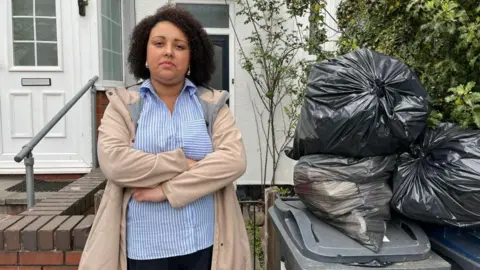
“There were so many bins it was causing conflict with neighbours”, said Alexandra Giddings, who lives with her 12-year-old son in a small house near the busy Ladypool Road, in another of the more deprived parts of Birmingham, within the city’s famous Balti Triangle.
Her son has chronic asthma and their home is damp, but she was unable to open the windows even during the recent warm spell, because of the stench from the bins that had been mounting up outside.
Things have begun to improve since strikers were prevented from delaying the non-striking bin workers from completing their rounds and army logistics experts were brought in to help with the clear-up.
Despite one recent collection, the bins are piling up again and the stink is really unpleasant.
“I want to go out at least for a walk. Now, I don’t want to because the smell’s horrendous,” Ms Giddings said.
The situation has changed since the beginning of the fifth week of the strike.


West Midlands Police stopped the strikers’ delaying tactics by threatening them with arrest and being fined, which enabled more working wagons to carry out daily collections, so that now about 50% of the council’s fleet is fully operational.
It cannot separate household waste from recycling, but everyone should now be getting a weekly collection.
People who had waited for six weeks to see a bin lorry have finally had their black bags removed, with the most noticeable improvement made since Army logistics experts were brought in, as they have been able to better co-ordinate the clear up.
The council said that the backlog of waste should have been cleared by this weekend.
By Wednesday, the amount of uncollected waste had fallen to less than 5,000 tonnes.
It has represented a major clear-up operation since the police tactics changed on the picket line and the behind-the-scenes interventions by the government.
One of the striking bin men, Dave, said: “We say to the people of Birmingham, obviously we’re residents ourselves, and we really apologise… we’re going to make every effort to come back to work as soon as possible and collect the bins again”.

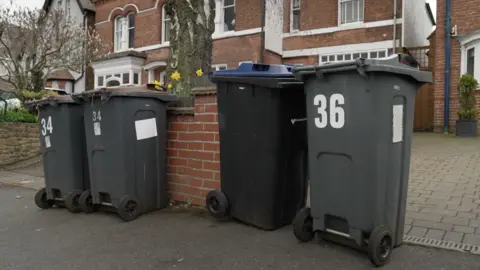
Nearly everyone I have spoken to has their own “rat” story.
Reports of infestations have been a headline writer and meme maker’s dream, but the rodents have proven surprisingly difficult to capture on film.
When, before the all-out strike began, one resident told BBC News that there were “rats the size of cats” roaming the streets, it gave birth to the phrase that will haunt Birmingham and may tarnish its reputation for the foreseeable future.







